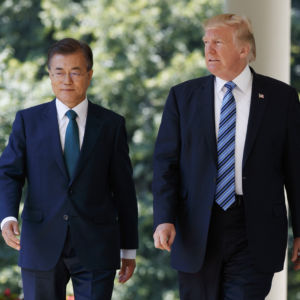SEOUL — More American flags fly on a typical Saturday afternoon in central Seoul than in an American downtown on the Fourth of July.
The sight of those flags, held high in parades of conservatives and rightists protesting the quest of South Korea’s president Moon Jae-in for reconciliation with North Korea and the imprisonment of his disgraced predecessor, Park Geun-hye, arouses mixed emotions. Aside from a few academic cranks, most Americans tend to be impressed by the pro-American sentiment among older Koreans who remember the U.S. defense of the South in the Korean War.
In an uncertain world, though, one wonders if this confidence in Uncle Sam to rush to defend South Korea in a dreaded Second Korean War is misplaced. Not the least reason for uncertainty is how President Donald Trump really feels about South Korea.
There he was, at the G7 gathering in Biarritz, France, not only saying how well he gets along with Kim Jong-un but also decrying the recent joint U.S.-South Korea war games as a waste of money. Oh, and he hasn’t backed down from his demand that South Korea pay $5 billion for having 28,500 U.S. troops in American bases on Korean soil for another year.
First off, the criticism of the war games is not only absurd but an affront to the American and South Korean military people who planned them and then carried them out. These last exercises were conducted largely on computers to see how U.S. and South Korean command structures coordinate with each other.
Unlike in previous years, no U.S. or ROK military forces deployed in those great training grounds south of the Demilitarized Zone, and no U.S. warships hovered offshore as planes took off from carriers and U.S. air bases. Or if there was some such activity, it went unnoticed and unpublicized.
Trump apparently has not consulted with American generals in Washington about the value of the war games. Were he to do so, he would discover their main concern is that no troops were in action outside their air-conditioned offices and it would really be a good idea to conduct war games as they did before he canceled them after his summit with Kim in Singapore more than a year ago.
Those days are gone. In fact, the fabric of the U.S.-Korea alliance may disintegrate still further while Trump looks for a response to his idea of elevating South Korea’s outlay for U.S. forces by five times. That demand could safely be laughed off as a bargaining position that nobody is taking seriously. The process of haggling, however, will strain U.S.-Korean relations at a time when they are already frayed by obvious differences over dealing with North Korea.
Trump may be all in favor of meeting Kim for another summit before the presidential election next year, but the North Koreans are flashing hot and cold in spates of weird rhetoric. Quite aside from attacks in the North Korean media against the war games, the North’s foreign minister, Ri Yong-ho, has denounced Secretary of State Mike Pompeo as “a poisonous plant of American diplomacy” for saying sanctions would stay unless or until the North gets rid of its nukes.
Oh my, not a nice way for a top diplomat to talk about anyone. Not a nice turn of phrase to apply to Pompeo, who has been to North Korea several times, who has met Kim, who has hosted North Koreans in New York and Washington, and who has seemed quite interested in jump-starting a negotiating process that’s sunk into limbo.
It could be, of course, that Trump is playing the good guy who can’t bend over as he would like for Kim while having to deal with the likes of Pompeo and his hawkish foreign security adviser John Bolton. The North Koreans blame those two for the breakdown of Trump’s second summit with Kim in Hanoi at the end of February.
Kim has scored one big victory, though. That’s Moon’s decision to pull out of the General Security of Military Information Agreement for sharing intelligence information with Japan. Could it be that Moon broke off the deal thinking that Kim might now be willing to sit down for more talking?
One thing is sure. North-South talks, Trump-Kim talks, none of this palaver will get Kim to give up his nukes. The flag-wavers know that much even if they’re in for a rude awakening about Trump. There’s no telling whose side he’ll be on if the whole process fails entirely and his friend Kim fires those short-range missiles, which Trump thinks are harmless, at bases in South Korea.

